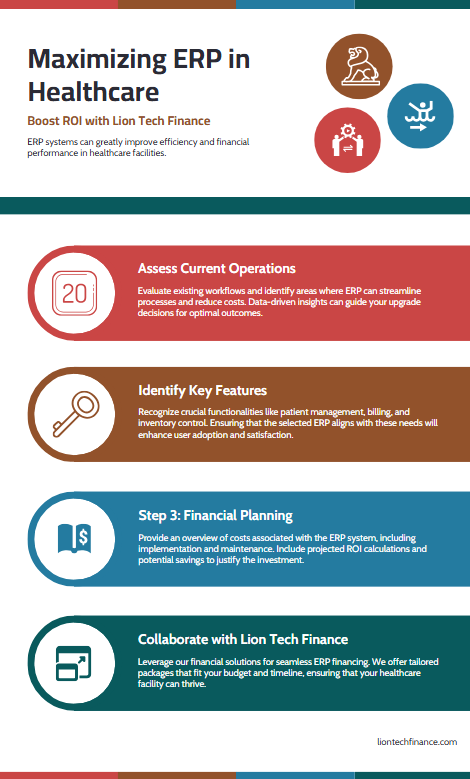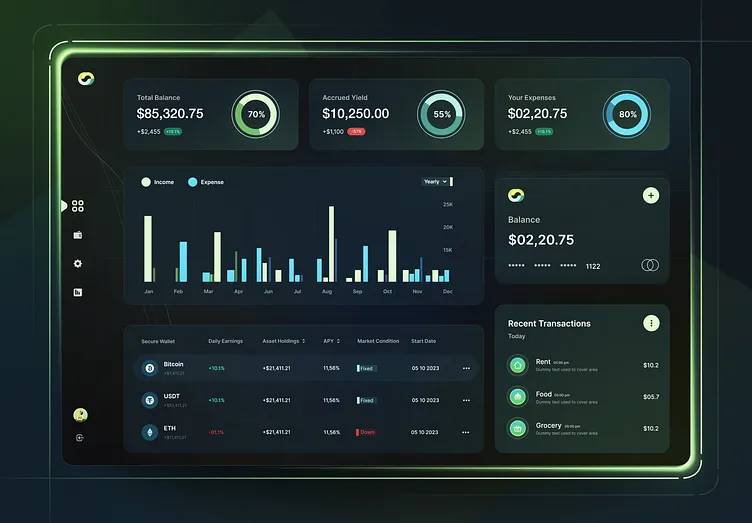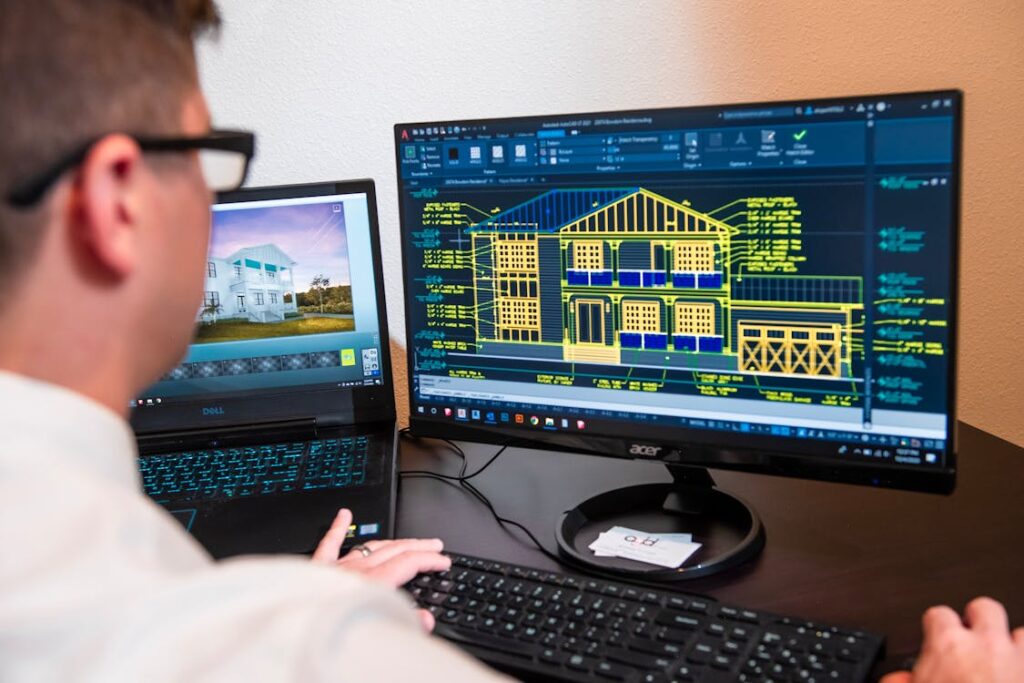How ERP Systems Transform Healthcare: Enhancing Patient Care, Efficiency, and Compliance
Introduction
In today’s dynamic healthcare environment, ERP systems are transforming how providers deliver patient care while improving operational efficiency, compliance, and cost management. This article explores ERP benefits, top solutions, challenges, best practices, and future trends in healthcare ERP implementation.
Benefits of ERP Systems in Healthcare
-
Streamlined Patient Care
ERP systems integrate patient records, appointment scheduling, and treatment plans into a centralized platform, ensuring:
- Accurate Patient Records: Unified access to patient information allows for better diagnosis and treatment.
- Reduced Errors: Automated data entry minimizes human error, ensuring accurate medication and treatment protocols.
- Improved Communication: Seamless collaboration between departments leads to better-coordinated care.
-
Operational Efficiency
With automation and real-time data insights, ERP systems help healthcare organizations:
- Optimize Resource Allocation: Effectively allocate staff, equipment, and facilities.
- Improve Inventory Management: Track and manage medical supplies to prevent shortages or overstock.
- Enhance Financial Management: Automate billing and claims processing for faster reimbursement cycles.
-
Regulatory Compliance
Compliance with healthcare regulations like HIPAA and GDPR is crucial. ERP systems ensure:
- Data Security: Advanced encryption and role-based access safeguard patient data.
- Audit Trails: Automated logs facilitate tracking and reporting compliance.
- Standardized Processes: Uniform workflows ensure adherence to regulatory requirements.
Top ERP Solutions for Healthcare
- Oracle NetSuite A cloud-based ERP solution offering scalable tools for managing financials, patient data, and supply chains.
- SAP S/4HANAKnown for its robust analytics and compliance features, SAP integrates seamlessly with existing healthcare systems.
- Microsoft Dynamics 365Popular for its user-friendly interface and strong integration capabilities with Microsoft tools, making it ideal for smaller healthcare providers.
Challenges in Implementing ERP in Healthcare
- High Implementation Costs Initial setup and customization can be expensive, especially for smaller facilities.
- Resistance to Change Healthcare staff may resist adopting new technology, necessitating robust training programs.
- Integration Complexities Merging ERP systems with legacy software can be time-consuming and prone to errors.
Best Practices for Healthcare ERP Implementation
- Conduct a Thorough Needs Assessment Understand the specific needs of your organization, from patient care to back-office operations.
- Prioritize Scalability Choose an ERP solution that can grow with your organization’s demands.
- Invest in Staff Training Ensure staff are adequately trained to maximize the system’s benefits.
Future Trends in Healthcare ERP
- AI and Predictive Analytics Integrating AI will enhance decision-making with predictive insights into patient trends and resource allocation.
- Telehealth Integration Future ERP systems will seamlessly incorporate telehealth capabilities, managing virtual appointments and patient data.
- Blockchain for Data Security Blockchain technology will play a significant role in safeguarding sensitive patient information and ensuring tamper-proof records.
Key Components of Healthcare ERP Systems
Implementing an Enterprise Resource Planning (ERP) system in healthcare organizations is pivotal for integrating various operational facets, thereby enhancing patient care, optimizing efficiency, and ensuring compliance. Below is an in-depth exploration of the key components of healthcare ERP systems:
1. Patient Management
Centralizing patient data is fundamental to delivering high-quality care. A robust ERP system consolidates patient demographics, medical histories, treatment plans, and appointment schedules into a unified platform. This integration enables healthcare providers to access comprehensive patient information in real-time, facilitating informed decision-making and improving care coordination. Moreover, it enhances patient engagement by providing portals for patients to view their records, schedule appointments, and communicate with healthcare professionals.
2. Financial Management
Effective financial management is crucial for the sustainability of healthcare organizations. ERP systems streamline billing processes, manage budgeting, and generate financial reports, offering a transparent view of the organization’s financial health. Automation of billing and claims processing reduces errors and accelerates reimbursement cycles. Additionally, real-time financial analytics assist in identifying cost-saving opportunities and optimizing resource allocation.
3. Human Resources Management
Managing human resources efficiently ensures that healthcare organizations maintain a competent and satisfied workforce. ERP systems oversee recruitment processes, payroll management, staff training, and certification tracking. They facilitate workforce planning by analyzing staffing needs and trends, ensuring that the organization is adequately staffed to meet patient care demands. Furthermore, they support compliance with labor laws and regulations by maintaining accurate employee records and managing benefits administration.
4. Supply Chain Management
An efficient supply chain is vital for uninterrupted healthcare service delivery. ERP systems monitor the procurement, inventory, and distribution of medical supplies and equipment. They provide real-time visibility into inventory levels, preventing shortages and reducing waste through optimized stock management. By automating procurement processes, ERP systems enhance vendor management and negotiate better terms, leading to cost savings. They also track the usage of supplies, aiding in demand forecasting and budget planning.
5. Regulatory Compliance
Adherence to healthcare regulations, such as the Health Insurance Portability and Accountability Act (HIPAA), is non-negotiable. ERP systems support compliance by maintaining accurate and secure patient records, implementing access controls, and providing audit trails. They ensure that data handling practices meet regulatory standards, thereby mitigating the risk of legal penalties and enhancing patient trust. Additionally, ERP systems facilitate reporting to regulatory bodies by generating necessary documentation and compliance reports.
Incorporating these components into a healthcare ERP system not only streamlines operations but also fosters a patient-centric approach, ensuring that healthcare organizations can deliver high-quality care while maintaining operational excellence and compliance.
Enhancing Patient Care Through ERP Systems
Enhancing patient care is a fundamental objective for healthcare organizations, and Enterprise Resource Planning (ERP) systems play a pivotal role in achieving this goal. By integrating various functions and providing real-time access to information, ERP systems significantly improve the quality and efficiency of patient care.
Improved Access to Patient Information
ERP systems centralize patient data, offering healthcare providers immediate access to comprehensive medical histories, treatment plans, and test results. This real-time availability supports informed decision-making, reduces the likelihood of medical errors, and ensures continuity of care across different departments and care settings. For instance, a physician can quickly retrieve a patient’s complete medical history during a consultation, facilitating accurate diagnoses and personalized treatment plans.
Streamlined Communication Across Departments
Effective communication among various departments is crucial for coordinated patient care. ERP systems integrate information from departments such as radiology, laboratory, pharmacy, and nursing, ensuring that critical data is readily available to all relevant healthcare professionals. This integration minimizes delays, reduces redundancies, and enhances the overall efficiency of care delivery. For example, when a lab test result is updated in the system, it becomes instantly accessible to the attending physician, enabling prompt decision-making.
Enhanced Patient Engagement
Modern ERP systems often include patient portals that empower individuals to take an active role in their healthcare journey. Through these portals, patients can access their medical records, schedule appointments, request prescription refills, and communicate directly with their healthcare providers. This level of engagement fosters a more satisfying patient experience, encourages adherence to treatment plans, and promotes better health outcomes. For example, a patient can view their lab results online and send a message to their doctor for clarification, enhancing understanding and compliance.
By leveraging ERP systems, healthcare organizations can create a more connected, efficient, and patient-centered environment, ultimately leading to improved care quality and patient satisfaction.
Enhancing Operational Efficiency Through ERP Systems
Automation of Administrative Tasks
ERP systems reduce manual work in billing, scheduling, and inventory, reducing errors and allowing staff to focus more on patient care.
Optimized Resource Allocation
ERP analytics provide insights into staffing and resource needs, ensuring availability and reducing redundancies.
Enhanced Financial Management
Real-time financial reporting and forecasting tools aid in better budgeting, cost management, and sustainability.
Boosting Operational Efficiency with ERP Systems
Implementing Enterprise Resource Planning (ERP) systems in healthcare organizations significantly enhances operational efficiency by automating administrative tasks, optimizing resource allocation, and improving financial management.
Automation of Administrative Tasks
ERP systems streamline various administrative functions, including billing, scheduling, and inventory management. By automating these processes, healthcare organizations can reduce manual errors, accelerate workflows, and free up staff to focus more on patient care. For instance, automated billing processes ensure timely and accurate invoicing, while automated scheduling systems facilitate efficient appointment management, reducing patient wait times and no-shows.
Optimized Resource Allocation
ERP systems provide comprehensive analytics that offers insights into staffing requirements, equipment utilization, and facility management. These insights enable healthcare administrators to allocate resources effectively, ensuring that the right personnel and equipment are available when needed, thereby reducing redundancies and minimizing operational costs. For example, by analyzing patient admission trends, an ERP system can help predict peak times and adjust staffing levels accordingly to maintain optimal patient care.
Enhanced Financial Management
Real-time financial reporting and forecasting tools within ERP systems aid in better budgeting, cost management, and financial sustainability. These tools provide healthcare organizations with up-to-date financial data, facilitating informed decision-making and strategic planning. For example, real-time tracking of expenses and revenues allows for immediate identification of financial discrepancies, enabling prompt corrective actions to maintain fiscal health.
By integrating these functionalities, ERP systems empower healthcare organizations to operate more efficiently, reduce operational costs, and enhance the quality of patient care.
Cost Management and Financial Benefits of ERP in Healthcare
Implementing Enterprise Resource Planning (ERP) systems in healthcare organizations offers substantial financial advantages by streamlining operations, enhancing financial planning, and optimizing revenue cycles.
Reduction of Operational Costs
ERP systems automate routine administrative tasks such as billing, scheduling, and inventory management, leading to significant reductions in operational expenses. By minimizing manual processes and associated errors, healthcare facilities can reallocate resources toward direct patient care, thereby improving service quality and patient satisfaction. For instance, automating inventory management ensures optimal stock levels, reducing waste and associated costs.
Improved Financial Planning and Forecasting
Access to real-time financial data through ERP systems enables healthcare organizations to engage in more accurate budgeting and forecasting. This capability allows for better anticipation of expenses, identification of cost-saving opportunities, and informed decision-making regarding resource allocation. For example, analyzing financial trends can help predict future expenditures, facilitating proactive financial management and ensuring the organization’s sustainability.
Enhanced Revenue Cycle Management
ERP systems streamline billing and claims processing, reducing delays and errors that can impede cash flow. By automating these processes, healthcare organizations can accelerate reimbursements, decrease denied claims, and improve overall financial health. Efficient revenue cycle management ensures that services rendered are promptly and accurately billed, leading to a more stable financial environment.
In summary, the integration of ERP systems in healthcare settings not only enhances operational efficiency but also provides significant financial benefits. By reducing operational costs, improving financial planning, and optimizing revenue cycles, healthcare organizations can achieve greater financial stability and allocate more resources to patient care.
Challenges in Implementing ERP Systems in Healthcare
Implementing Enterprise Resource Planning (ERP) systems in healthcare organizations presents several challenges that require strategic planning and effective management. Addressing these challenges is crucial for a successful ERP deployment that enhances operational efficiency and patient care.
High Initial Investment
Deploying an ERP system involves substantial upfront costs, including software acquisition, hardware upgrades, and implementation services. While these expenses can be daunting, the long-term benefits—such as improved efficiency, reduced operational costs and enhanced patient care—often justify the investment. To mitigate financial strain, healthcare organizations can explore financing options that spread the cost over time, making the investment more manageable.
Change Management and User Adoption
Transitioning to an ERP system necessitates significant changes in workflows and processes, which can be met with resistance from staff accustomed to existing systems. Effective change management strategies are essential to facilitate user adoption. This includes comprehensive training programs, clear communication of the benefits, and involving staff in the implementation process to foster a sense of ownership and acceptance.
Data Migration Complexities
Migrating existing patient data into a new ERP system is a complex task that requires meticulous planning to ensure data integrity and accessibility. Challenges include data compatibility issues, potential data loss, and ensuring compliance with healthcare regulations. Implementing a phased migration approach, conducting thorough data audits, and utilizing data migration tools can help overcome these complexities.
How Lion Tech Finance Assists with ERP Financing
Recognizing the financial challenges associated with ERP implementation, Lion Tech Finance offers tailored financing solutions to healthcare organizations. By providing flexible financing options, Lion Tech Finance enables organizations to invest in ERP systems without compromising their financial stability. Their expertise in technology financing ensures that healthcare providers can access the necessary resources to implement ERP systems effectively, thereby enhancing operational efficiency and patient care.
In summary, while implementing ERP systems in healthcare comes with challenges such as high initial costs, change management hurdles, and data migration complexities, strategic planning and leveraging specialized financing solutions like those offered by Lion Tech Finance can facilitate a smoother transition and successful deployment.
Best Practices for Successful ERP Implementation in Healthcare
Implementing an Enterprise Resource Planning (ERP) system in healthcare is a complex endeavor that requires meticulous planning and execution. Adhering to best practices can significantly enhance the likelihood of a successful deployment, leading to improved operational efficiency and patient care.
Comprehensive Planning and Goal Setting
A well-structured implementation plan is the cornerstone of a successful ERP deployment. Begin by clearly defining the objectives you aim to achieve with the ERP system, such as enhancing patient care, streamlining operations, or ensuring regulatory compliance. Establish realistic timelines and allocate necessary resources, including budget considerations and personnel assignments. Developing a detailed roadmap that outlines each phase of the implementation process helps in monitoring progress and addressing potential challenges proactively.
Stakeholder Engagement
Active involvement of all relevant stakeholders is crucial for the ERP system’s acceptance and success. Engage healthcare providers, IT professionals, administrative staff, and other departments early in the planning stages. This inclusive approach ensures that the system addresses the diverse needs of the organization and fosters a sense of ownership among users. Regular communication and feedback loops can help in identifying concerns and making necessary adjustments, thereby facilitating smoother adoption.
Comprehensive Training and Ongoing Support
Effective training programs are essential to equip users with the skills required to utilize the ERP system efficiently. Tailor training sessions to address the specific roles and responsibilities of different user groups within the organization. Provide hands-on training complemented by user manuals and online resources to reinforce learning. Establish a support system that offers assistance during and after the implementation phase to address any issues promptly. Continuous education and refresher courses can help in keeping the staff updated with system upgrades and best practices.
By focusing on comprehensive planning, engaging stakeholders, and providing thorough training and support, healthcare organizations can navigate the complexities of ERP implementation effectively, leading to enhanced operational performance and patient outcomes.
ERP System Benefits and ROI in Healthcare
- Section 1: Patient Care Improvements (highlighting improved access, engagement, and error reduction)
- Section 2: Operational Efficiency Gains (automation, streamlined processes)
- Section 3: Compliance and Cost Benefits (record-keeping, resource allocation)

Case Studies: Successful ERP Implementations in Healthcare
Implementing Enterprise Resource Planning (ERP) systems in healthcare organizations has led to significant improvements in operational efficiency, financial management, and patient care. Below are case studies highlighting successful ERP implementations and the role of Lion Tech Finance in facilitating these transformations.
Mayo Clinic
In 2022, Mayo Clinic selected Oracle Fusion Cloud Applications to enhance its business processes, aiming to support its ambitious strategy to cure, connect, and transform healthcare by 2030. The integration of ERP systems improved financial planning and forecasting, simplified procurement and supply chain management, and modernized human resources processes. This comprehensive approach enabled Mayo Clinic to gain a complete view of its finances and optimize various administrative functions, thereby enhancing overall operational efficiency.
Cleveland Clinic
Cleveland Clinic embarked on an ERP transformation by implementing Oracle’s cloud-based healthcare platform to enhance its finance and supply chain operations. The phased implementation began with Cleveland Clinic London in 2019, followed by its domestic facilities in 2020. This strategic move aimed to transform its finance function by enabling increased productivity and lower costs, as well as increasing the efficiency of operations by taking advantage of real-time insights and automated supply and demand planning.
Case Study: Prominent Oncology Hospital in Los Angeles
A leading oncology hospital in Los Angeles faced challenges with outdated financial systems that hindered efficient patient billing and financial reporting. Recognizing the need for modernization, the hospital partnered with Lion Tech Finance to implement a state-of-the-art ERP system. Lion Tech Finance provided tailored financing solutions, enabling the hospital to spread the cost of the ERP implementation over time, thereby minimizing financial strain. The new ERP system streamlined billing processes, improved financial transparency, and enhanced patient satisfaction by reducing billing errors and delays.
Case Study: Large Emergency Room in Austin, Texas
A major emergency room facility in Austin, Texas, struggled with inventory management inefficiencies, leading to frequent stockouts and overstock situations. To address these issues, the facility collaborated with Lion Tech Finance to deploy an advanced ERP system focused on supply chain optimization. Lion Tech Finance facilitated the financing of the ERP system, allowing the facility to implement the solution without compromising its financial stability. Post-implementation, the emergency room experienced a significant reduction in inventory costs, improved stock availability, and enhanced operational efficiency, ensuring that critical supplies were always on hand for patient care.
These case studies underscore the transformative impact of ERP systems in healthcare settings and highlight how strategic financing partnerships, such as those with Lion Tech Finance, can facilitate successful ERP implementations, leading to improved operational outcomes and patient care.
Future Trends in Healthcare ERP Systems
The landscape of healthcare Enterprise Resource Planning (ERP) systems is evolving rapidly, driven by technological advancements and the need for more efficient, secure, and patient-centric solutions. Key trends shaping the future of healthcare ERP systems include the integration of artificial intelligence (AI), the adoption of cloud-based solutions, and a heightened focus on cybersecurity and compliance.
AI Integration in ERP Systems
Artificial intelligence is transforming healthcare ERP systems by enhancing predictive analytics, automating routine tasks, and improving decision-making processes. AI algorithms can analyze vast datasets to forecast patient outcomes, optimize resource allocation, and identify potential operational inefficiencies. For instance, AI-powered ERP systems can predict patient admission rates, enabling hospitals to manage staffing and resources proactively. Additionally, AI facilitates the automation of administrative tasks such as billing and scheduling, allowing healthcare professionals to focus more on patient care.
Cloud-Based ERP Solutions
The shift towards cloud-based ERP solutions offers healthcare organizations scalability, flexibility, and cost-effectiveness. Cloud ERP systems enable multi-location healthcare providers to access centralized data in real time, facilitating seamless collaboration and continuity of care. Moreover, cloud solutions reduce the need for on-premises infrastructure, lowering maintenance costs and allowing for easier system updates and scalability. This transition supports the growing demand for telehealth services and remote patient monitoring, ensuring that healthcare providers can deliver quality care regardless of location.
Enhanced Cybersecurity and Compliance
With the increasing digitization of healthcare data, ERP systems are placing a stronger emphasis on cybersecurity and compliance. The rise in data breaches has prompted the implementation of advanced security measures, including encryption, multi-factor authentication, and continuous monitoring to protect sensitive patient information. ERP systems are also being designed to comply with stringent healthcare regulations such as the Health Insurance Portability and Accountability Act (HIPAA) and the General Data Protection Regulation (GDPR), ensuring that patient data is handled securely and ethically. By integrating robust security protocols, healthcare organizations can mitigate risks and maintain patient trust.
In summary, the future of healthcare ERP systems is being shaped by AI integration, cloud-based solutions, and a heightened focus on cybersecurity and compliance. These trends are driving the development of more efficient, secure, and patient-centric ERP systems, enabling healthcare organizations to meet the evolving demands of the industry and deliver superior patient care.
Top 10 Best ERP Systems for Healthcare Facilities
Selecting the right ERP system is critical for healthcare facilities aiming to improve patient care, streamline operations, ensure compliance, and manage costs effectively. Here’s an in-depth look at the top 10 ERP systems for healthcare, each designed to meet the unique demands of this industry. In addition to exploring the benefits and capabilities of each system, we’ll discuss how Lion Tech Finance can support healthcare facilities in financing these advanced ERP solutions through tailored leasing and financing options.
1. Oracle ERP Cloud for Healthcare
Oracle’s ERP Cloud is a robust, cloud-based solution designed for the specific challenges of healthcare. It offers powerful modules for financial management, supply chain, procurement, and patient management. Oracle’s comprehensive analytics and AI features enable real-time insights into operations, supporting better decision-making and improved patient outcomes.
- Key Features: Advanced analytics, real-time data access, integrated financials, and supply chain management.
- Recommended For: Large healthcare facilities needing a scalable and flexible ERP system.
- Learn More
2. Infor Healthcare ERP
Infor offers a suite of ERP applications specifically tailored for healthcare organizations. This system focuses on connecting clinical and business processes, improving supply chain and workforce management, and maintaining compliance. Infor’s CloudSuite Healthcare delivers a scalable, secure environment to manage all aspects of operations efficiently.
- Key Features: Workforce management, compliance tools, seamless data integration, and cloud-based scalability.
- Recommended For: Facilities looking for a system that integrates both clinical and operational processes.
- Learn More
3. SAP S/4HANA for Healthcare
SAP’s S/4HANA is a comprehensive ERP solution known for its powerful data processing and real-time analytics capabilities. Tailored for healthcare providers, it offers modules for patient management, billing, HR, and supply chain. SAP’s advanced analytics allow healthcare administrators to manage operations proactively and forecast future needs accurately.
- Key Features: Real-time data analytics, financial and HR management, scalable modules.
- Recommended For: Large healthcare systems that need extensive data processing and forecasting capabilities.
- Learn More
4. Microsoft Dynamics 365 Healthcare
Microsoft Dynamics 365 combines ERP with customer relationship management (CRM) capabilities, making it an ideal choice for healthcare organizations focusing on patient engagement. The system integrates data from various sources, giving healthcare providers a comprehensive view of patient needs, finances, and operational efficiency.
- Key Features: Integrated CRM, patient engagement tools, analytics, scalable cloud infrastructure.
- Recommended For: Facilities prioritizing patient engagement and a unified view of operations.
- Learn More
5. Epic Systems ERP
Epic is a widely recognized name in healthcare, known for its electronic health records (EHR) solutions. Epic’s ERP capabilities include patient management, billing, HR, and supply chain. Epic is especially valued for its seamless EHR integration, allowing healthcare providers to manage patient data, financials, and resources in one system.
- Key Features: EHR integration, patient management, HR, and billing solutions.
- Recommended For: Hospitals focused on EHR integration and comprehensive patient data management.
- Learn More
6. McKesson ERP for Healthcare
McKesson provides ERP solutions aimed at improving financial management and operational efficiency for healthcare providers. This system is particularly strong in the areas of supply chain and inventory management, helping facilities reduce costs and streamline procurement.
- Key Features: Supply chain optimization, inventory management, financial reporting.
- Recommended For: Facilities looking to optimize inventory and procurement.
- Learn More
7. Acumatica Cloud ERP
Acumatica is a flexible, cloud-based ERP system that supports a range of healthcare needs. It includes modules for financials, HR, and inventory management. Acumatica’s open API architecture allows for seamless integration with other healthcare technologies, making it a versatile option for facilities with unique operational needs.
- Key Features: Customizable modules, cloud-based flexibility, open API for integration.
- Recommended For: Small to medium-sized healthcare facilities needing customization and flexibility.
- Learn More
8. Meditech Expanse
Meditech Expanse offers a powerful ERP system integrated with EHR capabilities. Designed specifically for healthcare, Meditech provides robust patient management tools, real-time reporting, and compliance tracking. This system is valued for its clinical and financial data integration, supporting a comprehensive approach to patient care.
- Key Features: EHR integration, real-time reporting, compliance tracking.
- Recommended For: Facilities needing a specialized healthcare ERP system with EHR integration.
- Learn More
9. Workday Healthcare ERP
Workday’s ERP system focuses on financial and human capital management (HCM). Known for its user-friendly interface, Workday is designed to simplify HR processes, payroll, and compliance management, making it ideal for healthcare organizations with a significant focus on workforce management.
- Key Features: HR and payroll management, financial planning, compliance tools.
- Recommended For: Healthcare organizations emphasizing HR and payroll management.
- Learn More
10. NextGen Healthcare ERP
NextGen is specifically tailored for smaller healthcare facilities and physician practices. It offers essential ERP functionalities such as billing, patient scheduling, and financial management. NextGen is easy to use and provides a cost-effective ERP solution for smaller practices needing comprehensive but simple ERP tools.
- Key Features: Patient scheduling, billing, financial management.
- Recommended For: Small practices and physician offices needing straightforward ERP functionality.
- Learn More
How Lion Tech Finance Supports ERP System Financing for Healthcare
Implementing an Enterprise Resource Planning (ERP) system is a transformative step for healthcare facilities, offering unparalleled efficiency, streamlined operations, and enhanced patient care. However, the associated costs—spanning software, implementation, training, and upgrades—can be a significant barrier for many organizations. That’s where Lion Tech Finance steps in.
With years of expertise in technology financing, Lion Tech Finance specializes in providing tailored financing and leasing options designed to meet the unique needs of healthcare providers. We enable facilities to deploy cutting-edge ERP solutions without the burden of substantial upfront costs, ensuring they can focus on what matters most: delivering exceptional patient care.
Why Choose Lion Tech Finance for ERP Financing?
Flexible Payment Terms
We understand that every healthcare facility has its financial rhythm. Our customizable payment plans are designed to align seamlessly with your budget and cash flow, allowing you to invest in an ERP system without financial strain.
Comprehensive Financing Coverage
From initial software acquisition to implementation and training, our financing solutions cover every aspect of ERP deployment. This holistic approach ensures that your organization has the resources to integrate and fully utilize the system without compromising on quality or scope.
Seamless Upgrade Opportunities
The rapid evolution of technology can make even the best ERP systems outdated. Lion Tech Finance empowers you to stay ahead by offering flexible upgrade options. As new ERP versions or features become available, our financing solutions ensure you can adapt without financial hurdles.
Tax Efficiency
Leasing through Lion Tech Finance may provide tax advantages, such as potential deductions, helping your facility optimize its financial management while investing in the future.
The Lion Tech Finance Promise
When you partner with Lion Tech Finance, you’re not just securing financing—you’re gaining a strategic partner dedicated to your success. Our team works closely with healthcare facilities to understand their unique needs and provide solutions that empower them to harness the full potential of ERP technology.
Let us help you transform your healthcare organization. Contact Lion Tech Finance today to explore flexible financing options that enable you to focus on what truly matters: delivering exceptional patient care with the support of advanced ERP systems.










